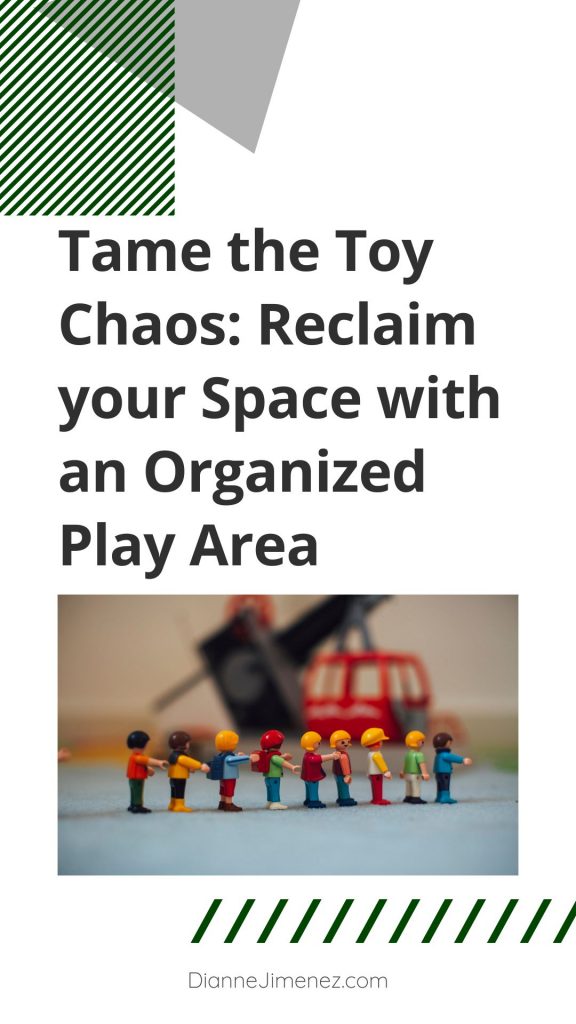5 Smart Ways to Organizing Kids' Toys Before the Holidays
EPISODE 59

by Dianne Jimenez
This article takes 3.5 minutes to read
Don’t have time to read this? Listen to the podcast episode instead:
Subscribe to the
THE ORGANIZED-ISH PARENT PODCAST
and never miss a bonus episode!
5 Smart Ways to Organizing Kids’ Toys Before the Holidays
The episode at a glance:
00:00 Introduction to Organizing Kids’ Toys
01:28 Holiday Season and Toy Influx
04:15 Five Main Ways to Organize Kids’ Toys
04:49 Organizing By Category or Type
05:44 Organizing By Age
07:36 Organizing by Supervision Needs
09:16 Organizing By Favorites
11:35 Combining Methods for Best Results
12:17 Conclusion and Next Steps
Click here to listen to the episode now
How to Organize Kids’ Toys and Keep Your Sanity This Holiday Season
The holiday season is here, and with it comes the joy of giving, family gatherings, and—let’s be honest—a tidal wave of new toys. As parents, we’ve all been there: staring at the pile of blocks, dolls, action figures, and craft kits that seem to multiply overnight. It’s overwhelming!
But here’s the good news: with a bit of planning and the right strategies, organizing kids’ toys doesn’t have to feel impossible. Whether you’re preparing for the holidays or just trying to reclaim your living room, I’m here to help you create systems that are both practical and easy to maintain.
Want to go from 'drowning' to peace of mind?
Why Organizing Kids’ Toys Matters
Let’s face it—when toys are everywhere, it can feel like chaos. Kids struggle to find what they want, you’re left stepping on rogue Legos, and cleanup becomes a battle no one wants to fight.
By setting up an intentional system for organizing toys, you’ll:
- Reduce clutter and overwhelm.
- Make it easier for kids to find and put away their toys.
- Create a calmer, more functional home.
And the best part? Teaching your kids how to organize their toys gives them valuable life skills they’ll use for years to come.
find out how families with 3+ kids tackle the beast: laundry!
5 Game-Changing Ways to Organize Kids’ Toys
When it comes to organizing kids’ toys, there isn’t a one-size-fits-all solution. Families are different, and so are their play spaces. That’s why I’ve narrowed it down to five versatile methods that you can adapt to fit your home.
1. Organize by Category
This is a tried-and-true method for a reason. Grouping toys by type—like blocks, puzzles, or stuffed animals—makes it easy for kids to find what they’re looking for and know where to put things back.
Pro Tip: Use labeled bins or baskets to keep categories separate. Clear bins are great for visibility, and labels with pictures can help even the youngest kids tidy up independently.
My Secret Sauce for setting the kids up for success
2. Sort by Age
If you have kids of different ages, organizing toys by age can be a lifesaver. For example, younger kids’ toys can stay in one area, while older kids’ games and activities are stored elsewhere.
This method works best if your kids play in separate zones of the house. Just be sure to keep a system in place so toys don’t end up scattered everywhere.
3. Separate by Supervision Needs
Let’s be honest—some toys require more cleanup (and patience!) than others. Items like craft supplies, board games with small pieces, or anything sticky, gooey, or glittery are best kept in a supervised play area.
3 things to establish now before losing your s#!t later on (during the school year)
Not only does this prevent major messes, but it also creates opportunities for quality time. Get involved in the creative process—it’s fun for the kids and helps you avoid hours of post-play cleanup.
4. Focus on Favorites
If your child tends to play with the same toys over and over, make those favorites the stars of the show. Keep them easily accessible at your child’s eye level and store less-used toys out of sight.
Rotating toys every few weeks can make old toys feel new again while keeping clutter in check. Bonus: this is the perfect opportunity to declutter items your kids have outgrown.
Free training: "How to find time in a busy schedule"
5. Combine Methods for the Perfect Fit
Most families find that a combination of these methods works best. For instance, you might group toys by category but store supervised activities like craft supplies in a separate bin. Experiment and see what works for your space!
Getting Ready for the Holidays
With the holiday shopping season in full swing, now is the perfect time to get your toy organization under control. A little effort now will make it easier to manage the new wave of toys heading your way.
If you’re ready to take your toy organization to the next level, I’ve got just the thing for you: my course, Tame the Toy Chaos: Reclaim Your Space with an Organized Play Area.
This course will guide you step-by-step through:
- Decluttering your toy collection.
- Setting up a functional play area.
- Creating systems that even your kids can help maintain.
Stay on track with laundry & tips to getting the kids involved
Ready to Tame the Toy Chaos?
If you’re tired of feeling overwhelmed by toys, this is your chance to reclaim your space. Sign up for Tame the Toy Chaos today at diannejimenez.com/tamethetoychaos, and take advantage of our special holiday pricing.
Let’s make this holiday season the one where toys bring joy—not stress.
Final Thoughts
Organizing kids’ toys doesn’t have to be a struggle. With these strategies, you can create a home that feels calm, functional, and even fun.
What’s your biggest challenge when it comes to organizing toys? Let me know in the comments—I’d love to help!
Download Transcript / Listen on Apple Podcast / Listen on Spotify / Watch on YouTube

Can you think of someone who would also benefit from reading this?
Send it to them:

